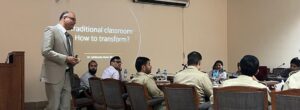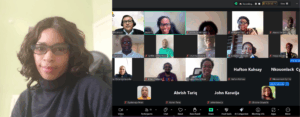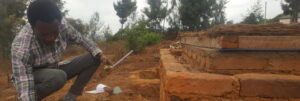
From learners to leaders: equipping East African researchers with the skills to generate new knowledge solutions
A complex web of global challenges
Communities across East Africa are facing an interconnected web of local and global challenges, from climate change and food insecurity to rapid population growth and economic instability. Locally relevant evidence-based solutions are urgently needed to tackle some of the most critical questions facing the region.
Luckily, there is a thriving community of talented and committed East African researchers eager to address these challenges. Alongside infrastructure gaps, a lack of professional development and training opportunities often holds back their careers. Can Open Research offer news tools to researchers and help them create knowledge in new ways?
Enabling East African researchers
INASP’s Digital Hub for Open Research in East Africa – part of our Rising Scholars community – aims to equip researchers in the region with the knowledge, skills and networks they need to support the health and wellbeing of their societies, economies and communities. Launched in 2024, thanks to a partnership with the Templeton World Charity Foundation Inc., the Digital Hub provides an accessible space for learning and networking. It aims to equip thousands of early-career East African researchers – women and men – with the tools, technologies and approaches needed to become confident and skilful ‘open researchers’ – researchers capable of navigating the complexity of global challenges within their local contexts and deploying open science tools and techniques as they do.
In collaboration with two experienced researchers specialising in community-based and open research approaches, Walter Odongo from Uganda and Thomas Mboa from Cameroon, we’ve developed a five-module learning programme to deepen the understanding of open research principles and practices.
The training leverages INASP’s deep digital learning and community building expertise, and our Rising Scholars platform, to deliver a digital learning experience on open research practices, exploring topics such as open data and citizen science. The training offers knowledge and practical tools to help early-career researchers design, deliver and communicate research that centres community needs, and that combines scientific rigour with the ability to position knowledge for impact.
“Most early career researchers in East Africa struggle to position themselves in their professional spaces due to their inability to publish and be recognized. This training provides opportunities for researchers to publish and publicize their research outcomes in a way that makes it impactful and meaningful to all stakeholders.” – Walter Odongo, Uganda
Building individual capacity to support the wider research community
Aneth David, a biotechnologist from Tanzania, has a strong background in natural sciences but had never received any formal training in research design for citizen engagement. For Aneth, the Digital Hub’s open research training not only provided her with relevant knowledge and practical skills, it also connected her to an engaged community of researchers, which further deepened her learning experience.
“The programme enabled me to hear how other researchers were designing and conducting citizen science and how I can improve my own plan for an upcoming citizen research project.” – Aneth David, Tanzania
Having completed and experienced the positive impact of the Digital Hub’s five training modules, Aneth is now joining our ‘Open Research Champions’ group where she will train to co-facilitate future iterations of the programme, sharing her learning with wider networks of researchers.
By joining our Open Research Champions group researchers transition from training participants into future facilitators. After completing the core modules, participants are offered an additional training session which provides practical skills and specific tools in pedagogy and workshop facilitation so they can be an active part of the training programme going forward.

Aneth during an experiment on the effect of Desmodium spp. on maize infestation of Striga weed at the International Centre for Insect Physiology and Ecology, Mbita, Kenya
“ Research Champions not only strengthen their expertise in facilitation, but also gain skills in explaining open research practices in ways that are relevant to their peers and communities—supporting immediate uptake while preparing East African researchers for a future where open research will be increasingly central.” – Andy Nobes
Positive impact and new ways of thinking
The Digital Hub’s training is delivered predominantly through digital platforms, but with a specific focus on Kenya, Rwanda, Tanzania and Uganda. So far, over 100 researchers from the four countries have taken the modules and their feedback has been overwhelmingly positive, with 98% of participants reporting increased confidence in key topics.
Researchers have shared how participation in the Digital Hub’s training modules and networking opportunities has not only introduced them to new knowledge and skills but has also inspired new ways of thinking about how they approach future research activities.
“I found the Citizen Science module really enlightening. It challenged how I previously thought about who can contribute to research and made me realize just how powerful community involvement can be. Coming from a background where I’ve worked closely with grassroots groups, I saw a lot of parallels between the module content and the kind of informal data collection communities already do—often without recognition. This module helped me see how to bridge that gap and how citizen science can be a meaningful way to value local knowledge and voices, especially in underrepresented contexts like those in my home country.” – Woman, Kenya
“Personally, the modules have broadened my knowledge on citizenship research, gender inclusion, community engagement research, and open science. These are topics of great interest with a strong drive towards collaboration, providing solutions, and innovation” – anonymous survey feedback.
Putting people at the heart of research
The Digital Hub aims to harness the transformative possibilities of open research to enable talented young East African researchers to bring fresh perspectives and alternative philosophies to questions of human success, progress and development. East African researchers who are confidently able to navigate the research system – including the needs and voices of their communities and mastering open research practices – will make for research that is better able to meet global challenges with robust and compassionate solutions.
For Eric Kalori, a physicist from Tanzania, the training programme offered a new perspective on inclusivity and ethical considerations when working with diverse communities.
“The challenges discussed, such as ensuring equitable power distribution and overcoming barriers to participation, […] highlighted areas where I can improve my own research practices. Overall, the course has provided me with a solid foundation and actionable strategies for conducting impactful and inclusive research.” – Eric Kalori, Tanzania
As well as benefiting researchers, open research approaches and outputs can make research more accessible and more useful for citizens, communities, and policymakers, enabling them to effectively tackle social and economic challenges with relevant, evidence-informed solutions.
Developed and led by a global team, rooted in East Africa, the Digital Hub is continuing to build a digitally connected, East African rooted open research community, that will grow to support thousands of early career open researchers equipped and ready to tackle today’s global challenges.
For more information about INASP and Rising Scholars, read more here.

 Previous Post
Previous Post Next Post
Next Post


